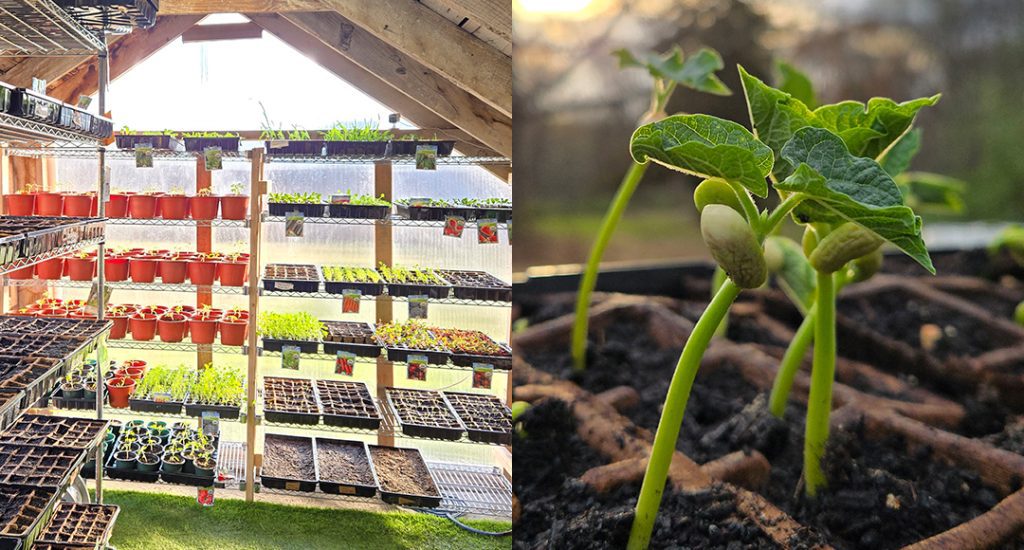What are microgreens?
Microgreens are young, edible plants harvested when they are just a few inches tall, typically after the first set of true leaves appears. These tiny greens pack a punch, offering intense flavors and nutritional benefits in a small package. Unlike baby greens like spinach which are harvested when they are more mature, microgreens are harvested early, which gives them a unique, concentrated nutrient profile.
Some popular varieties include:
- Arugula (spicy and peppery)
- Basil (fresh and aromatic)
- Cilantro (sharp and citrusy)
- Radish (crunchy and spicy)
- Mustard greens (hot and tangy)
- Pea shoots (sweet and fresh)
Microgreens can be grown at home with minimal effort, even on your kitchen sill. They are usually ready for harvest in just 7-21 days, making them a quick and easy option for home gardeners and food lovers alike.

Health Benefits of Microgreens
- Packed with Nutrients
Microgreens are often considered to be far more nutrient-dense than their mature counterparts. Despite their small size, they are rich in essential vitamins and minerals, including vitamins A, C, E, and K, as well as key minerals like magnesium, potassium, and iron. The concentration of nutrients in microgreens can be up to 40 times higher than in mature plants. - Rich in Antioxidants
Many microgreens are high in antioxidants, which help fight oxidative stress and reduce inflammation in the body. Antioxidants play a crucial role in protecting your cells from damage caused by free radicals, contributing to overall health and potentially reducing the risk of chronic diseases like heart disease and cancer. - Supports Immune Function
Thanks to their high vitamin C content, microgreens are excellent for boosting your immune system. Vitamin C helps stimulate the production of white blood cells, which are responsible for fighting off infections. Microgreens like cilantro, kale, and parsley are particularly high in this immunity-boosting vitamin. - Improved Digestion
Many microgreens are a rich source of fiber, which supports healthy digestion. Fiber helps regulate bowel movements, prevents constipation, and promotes the growth of beneficial gut bacteria. Varieties like broccoli and sunflower microgreens are particularly fiber-rich, making them a great choice for digestive health. - Heart Health
Certain types of microgreens, like radish and mustard greens, are known to have compounds that support heart health. They can help reduce blood pressure, improve cholesterol levels, and promote circulation. The high potassium content found in many microgreens also helps regulate blood pressure, which is important for cardiovascular health. - Weight Management
Low in calories but high in essential nutrients, microgreens are an excellent addition to any diet, particularly for those who are watching their weight. They can add flavor and texture to meals without contributing many calories, making them a great choice for anyone looking to maintain or lose weight. - Improved Skin Health
The vitamins and antioxidants in microgreens, especially vitamin E, help promote healthy, glowing skin. Vitamin E has anti-aging properties, preventing premature wrinkles and signs of aging by combating oxidative damage and promoting cell regeneration.
How to Add Microgreens to Your Diet
Adding microgreens to your meals is easy! Here are some simple ways to incorporate them:
- Salads: Toss a handful of microgreens into any salad for an added burst of flavor and nutrition.
- Smoothies: Blend microgreens like pea shoots or spinach into your smoothies for an extra nutrient boost.
- Sandwiches & Wraps: Use microgreens as a topping for your sandwiches or wraps to replace traditional lettuce.
- Garnishes: Microgreens make beautiful and flavorful garnishes for soups, tacos, and other dishes.
- Juices: Add a handful of microgreens to your fresh juices for a nutrient-packed drink.
Microgreens are more than just a trendy food—these tiny plants are nutrient powerhouses that provide numerous health benefits. From boosting your immune system to supporting heart health, incorporating microgreens into your diet is an easy and delicious way to support your overall wellness. Whether you’re growing them yourself or buying them fresh, these little greens are a big deal for your health.













